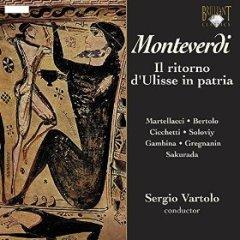Monteverdi - Il Ritorno d'Ulisse in Patria (2007)
Monteverdi - Il Ritorno d'Ulisse in Patria (2007)

1. Prologo. L'umana fragilità. Mortal cosa son io 10:15 2. Sinfonia. di misera regina 12:29 3. Sinfonia. Duri e penosi 15:49 4. Sinfonia - Superbo è l'uom - In questo Basso mondo 11:41 5. Dormo ancora o son desto? 5:17 6. Sinfonia - Cara e lieta gioventù - Tu d'aretusa al fonte 17:17 7. Donate un giorno ob dei 11:22 8. Come, ob dome mal si salva - Pastor d'armenti può - Ulisse genero 9:23 9. Sinfonia. Lieto cammino - O gran figlio d'Ulisse - Che veggio oh 19:16 10. Eurimaco, la donna insomma 4:19 11. Sono l'altre regine - Apportator d'alte novelle 12:19 12. Compagni udiste 8:14 13. Perir non puo' 3:48 14. Io vidi 3:24 15. Del mio lungo viaggio 6:38 16. Sempre villano Eumete 7:05 17. Generosa Regina 8:40 18. Ecco l'arco d'Ulisse 13:37 19. O dolor, o martir 7:19 20. E quai nuovi rumori 3:24 21. Forza d'occulto affetto - E' saggio Eumete 6:14 22. Fiamma è l'ira 4:06 23. Gran Giove, alma de' Dei 8:33 24. Ericlea che vuoi far? 5:05 25. Ogni vostra ragion - O delle mie fatiche 14:03 Il Tempo - Walter Testolin La Fortuna - Angela Bucci Amore - Lia Serafini Giove - Gian Paolo Fagotto Nettuno - Raffaelle Costantini Minerva - Angela Bucci Giunone - Lia Serafini Ulisse - Loris Bertolo Penelope - Gabriella Martellacci Iro - Davide Cicchetti Antinoo - Walter Testolin Telemaco - Makoto Sakurada Pisandro - Salvatore Gaias Anfinomo - Gian Paolo Fagotto Eumete - Giovanni Gregnanin Ericlea - Maria Elena Fincato Eurimaco - Juan Gambina Melanto - Sofiya Solovey Umana Fragilità - Maria Elena Fincato Sergio Vartolo - conductor
Since his recording of L’Orfeo for Naxos (22:1), Sergio Vartolo has taken up residence in Pigna, Corsica, the site of a number of musical events lately, to record all three of Monteverdi’s operas. This issue is the conclusion of the cycle. Like Alan Curtis (29:2), René Jacobs, and Gabriel Garrido (24: 5), he uses the five-act division of the original libretto. Nikolaus Harnoncourt (5:5) and William Christie (28:1) used the three-act division that Monteverdi made for the score. But the division has little real effect on the performance. Much more significant is the added instrumentation (or orchestration in some cases) that most conductors have found necessary to pad out the minimal surviving score. Vartolo follows Curtis and the pioneering Rudolf Ewerhart in eschewing any addition to the instrumental forces. Oddly, in an extensive and valuable annotation of over 40 pages by Ellen Rosand, nothing is mentioned about this aspect of the production. Twelve players are named in addition to Vartolo’s work at the harpsichord and spinet. (Curtis’s notes neither name nor even count the players.) Nor are any details offered about the possible interpolation of instrumental interludes from works of either the composer or others.
As for the performance, Rosand asserts that this series of Monteverdi opera recordings is the first in which “both cast and direction are pre-eminently Italian.” She asserts that in other versions “even when the pronunciation is correct (which is rare), one cannot help noticing an incomprehension of the flow and expressive accentuation of the phrase.” While this may be arguable, there is no denying that she is pointing out the strong points of this performance. Bertolo is a superb Ulisse, and Martellacci as the faithful wife complements his role. Makoto Sakurada fits right in with the Italian cast as Telemaco. Davide Cicchetti as Iro makes the most of his comic lament, one of the first excerpts of the opera ever recorded.
The three very full discs are not even timed, and the libretto does not indicate track numbers. In general, each scene is tracked, though a few short scenes are joined and a few long scenes are divided. The ample booklet is a real value in this package, an issue that is competitive with any previous version. ---FANFARE: J. F. Weber, arkiv.com
download (mp3 @128 kbs):
uploaded yandex 4shared mega mediafire solidfiles zalivalka cloudmailru oboom








